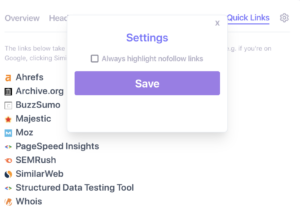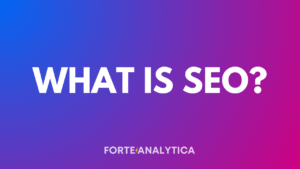Ever since Google introduced nofollow links, there has been a debate about dofollow vs nofollow links.
Dofollow and nofollow links significantly affect search engine optimization and how Google perceives and evaluates websites.
There’s no doubt that dofollow links are the strongest signal to Google that they should pass SEO juice to the linked page, but it doesn’t mean nofollow links should be discarded as non-beneficial in any link building campaign.
I’m going to cover the differences between dofollow and nofollow links, their importance for your overall SEO campaign, when to use each type of link, and why you shouldn’t really care about either.
What are dofollow and nofollow links?
Dofollow and nofollow are value attributes that can be assigned to HTML link tags. These attributes provide Google crawlers with clear instructions on how to treat a link to another page/site.
Dofollow links
A dofollow link allows the Google bot to follow and pass link equity/juice to the linked page. In other words, Google will consider dofollow links as recommendations or endorsements.
This is what a dofollow link looks like in plain HTML:
<a href="https://forteanalytica.co.uk">This is dofollow.</a>There’s no getting away from the fact that a dofollow link is one of the most powerful signals to Google that your site or page can be trusted. After all, trust is the core foundation of Google letting your site rank – if Google doesn’t trust your DR4 finance site, then why would they let you rank in the SERPS in one of the most profitable niches?
For example, if you are talking about a friend and you trust what they said or told you, you are vouching for them, so in that same way, you would “give them” a do-follow link.
Another example is when I started a reactive digital PR campaign for one of my sites, and I received a nofollow link from a large DR90 publisher who is notorious for only giving nofollow links.
I got another link from the same DR90 publisher a few weeks later. This time, it was a dofollow backlink to an internal page, and it most likely was because the journalist found my website’s article ranking highly on Google organically when the journalist was researching a source/reference for their article.
Nofollow links
A nofollow link is a link with a rel=”nofollow” attribute. This attribute tells Google not to pass link equity to the linked page, preventing link juice from flowing. Nofollow links were introduced in 2005 to combat spammy and low-quality backlinks.
If you were in the SEO industry from 2001 to 2005, you will remember that everyone was fond of blogroll links, mass link exchanges, and the famous comment links, which surprisingly still happen today!
You can easily detect a nofollow link by the rel-tag:
<a href="https://forteanalytica.co.uk" rel="nofollow">This is nofollow.</a>I don’t think you are an SEO if you don’t use the Detailed SEO Extension by Glen Allsopp; it has a handy option for highlighting any nofollow links on a page.

Dofollow vs nofollow links: A detailed comparison
Website owners, webmasters, and SEO professionals have long discussed the dofollow vs nofollow debate. Over the past few years, there has even been debate about whether dofollow may actually be a good thing!
To properly understand dofollow and nofollow links, you need to learn the different aspects of their usage across various important aspects of SEO.
1. Link equity and SEO value
Link equity, also known as link juice, is the value that Google passes from one page to another through hyperlinks.
Dofollow links significantly transfer link equity, which can positively influence a website’s search engine rankings.
In a great article, Paul Madden of Opp Hive explained how nofollow links nearly never pass link equity, making them less impactful for SEO purposes.
2. Crawling and indexing
Google’s crawlers follow dofollow links and index the linked pages, considering them valuable content. This helps them discover and index new pages faster.
However, nofollow links may not be crawled or indexed by search engines, limiting their visibility in search results.
3. User engagement and traffic
Dofollow links can generate organic traffic as they contribute to improving a website’s visibility in search engine results.
When users click on dofollow links, they are directed to the linked page, potentially increasing user engagement and driving more traffic.
This is arguably the most important part of the whole comparison. Whether it is dofollow or nofollow, the link itself will pass more value if it gets organic clicks in the article!
So, nofollow links may not directly impact your Google rankings, but they can still attract traffic if published on high-traffic websites that attract organic user clicks.
4. Link building strategies
Dofollow links are usually the one and only target of link building strategies, as they are seen as the only valuable backlinks to buy or earn. This is short-sighted, in my opinion.
Acquiring relevant and high-quality dofollow backlinks from authoritative websites can improve your website’s rankings on Google.
But blending nofollow links in amongst the dofollow links can help disguise your link building activities and help with a balanced link profile.
Generally, most backlink profiles should be 70% dofollow and the latter 30% nofollow. However, Google’s John Mueller would disagree with any backlink ratio. John said in 2022, “Any problem your site has would not be due to the ratio of follow to nofollow links. That’s just not a thing.”
I’m not sure about that, John.
5. Social media and indirect SEO benefits
Many social media platforms, such as Facebook, Twitter, and LinkedIn, attribute nofollow (and noreferrer) to the links shared on their platforms.
While these nofollow links may not directly influence Google rankings, they can still generate traffic, enhance brand visibility, and indirectly impact SEO through increased brand exposure and social signals.
There is no refuting the value in clicks from external pages or platforms, especially after Google’s anti-trust trial in 2023, where executives explained how they track user behavior on Google’s SERPS, so you would have to be naive to think that Google doesn’t track external link clicks.
Why you shouldn’t care about dofollow links
I’ve got myself into a habit now of the past few years of not even caring if the link is dofollow or nofollow.
This is due to using kitchen sink link building tactics, which basically means I am doing everything across many different platforms to build links to my sites.
I usually deploy guest posts, link insertions/niche edits, and digital PR. I usually aim for dofollow most of the time on guest posts and link inserts, but if the owner says they mark it as nofollow or sponsored, I’ll still buy the link!
Why pay for a nofollow or even a sponsored tag? Well, simply put, the chances are the site is strict and most link buyers will avoid it as they won’t pay for nofollow links. It’s safe to say that the site will never become a link farm anytime soon.
On the other hand, with reactive or proactive digital PR, you will get a wide range of nofollow and dofollow links that are out of your control of how they get tagged, but it helps with your backlink profile ratio between dofollow and nofollow links.
Do I ask these large publications if they can change the link from nofollow to dofollow? No. Why would I waste the time? I am nearly sure that a DR80+ and ideally relevant publication that links to your site is a pretty good signal whether it passes link juice or not.
If you are managing a wide range of link building campaigns, which you should be, then you want to have a natural-looking nofollow and dofollow ratio. If you actively build 20 links per month, and they are all dofollow, could you give any bigger sign to Google that you are buying links? After all, buying links is against Google guidelines…
Frequently asked questions
Do nofollow links affect SEO?
Nofollow links have a minimal direct impact on SEO since they do not pass link equity. However, they can still contribute to indirect SEO benefits such as driving traffic, enhancing brand visibility, and increasing social signals.
Should I only focus on acquiring dofollow links?
While dofollow links are generally more valuable for SEO, it’s important to have a balanced link profile. A combination of both dofollow and nofollow links from relevant and authoritative sources can provide a more natural and diverse backlink profile.
Should I use only nofollow external links on my website?
Using nofollow links on your website can be beneficial for managing your outbound link profile. It can help prevent spammy or low-quality links from negatively impacting your website’s SEO. Using nofollow links when necessary can signal to Google that you are trying to be responsible with good linking practices.


